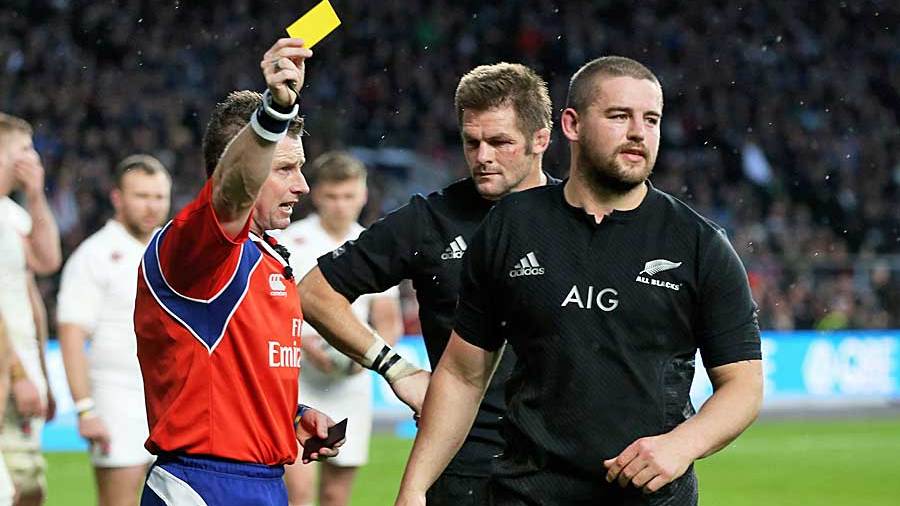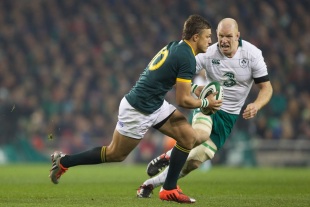|
The John Mitchell Column
Time for a cricket-style TMO system
John Mitchell
November 11, 2014

Nigel Owens use of the TMO angered Steve Hansen © Getty Images
Enlarge
A big talking point from the Twickenham Test was how the crowd influenced referee Nigel Owens by reacting to replays on the big screen. All Blacks hooker Dane Coles was yellow-carded for lashing out with a boot at Dylan Hartley after the crowd had voiced its disapproval, and also made Owens refer Charlie Faumuina's try to the TMO as Beauden Barrett was lining up the conversion. Hansen said afterwards that TV producers are starting to have a big influence on games, as they determine what replays get shown and that said replays always favour the home side. That was also the case at Ellis Park last month when the crowd alerted referee Wayne Barnes to Liam Messam's shoulder charge on Schalk Burger. As a result, a penalty was awarded, which Pat Lambie slotted to give the Springboks victory. I believe the only way to prevent TV producers from influencing matches is to introduce a decision review system, like in cricket, that allows a captain to challenge a certain number of refereeing decisions per match. How it would work is that the captain gets to retain a challenge if he gets it right, but loses it if he gets it wrong. A referee would then only refer to the TMO if his decision was challenged by a captain and not if the crowd reacted to an incident seen on the big screen.
While the All Blacks came out on the right side of the scoreboard, they will be worried about their goal-kicking, with Barrett and Aaron Cruden missing five kicks between them. Moreover, they will be concerned about their lineout delivery, which is affecting their first-phase lineout attack and ability to build pressure with the ball. Their attack in general has become a bit predictable, and they have to get the balance right between going wider and playing more direct with their forward pack. However, the All Blacks did well to identify where the England defence would attack hard and, at times, went one channel wider. A prime example was when Kieran Read put Owen Franks into space in the second half. On the All Blacks' second-phase ball, the forward runner off nine would either receive the ball in the first channel to tip it on or it would be played out the back to the backs. They did that a lot in the first half to create direct pressure on the receiver and it helped to generate gaps in immediate channels further out. In Dublin, Ireland coach Joe Schmidt outsmarted his Springbok counterpart Heyneke Meyer. The Irish were ready for everything South Africa threw at them. There was a lack of variety in the Springbok attack, which wasn't the case when they beat the All Blacks at Ellis Park. 
Handre Pollard came in for some flak for his performance
© Getty Images
Enlarge
Schmidt also knew that French referee Romain Poite would let a fair bit go at the breakdown. And every time that Marcell Coetzee, Duane Vermeulen or Bismarck du Plessis tried to steal the ball on the ground, they got smashed back. Ireland also exposed the Boks' back three when Conor Murray's kick behind the defence was collected by Tommy Bowe, who scored a try that put the result beyond doubt. In my opinion, Cornal Hendricks didn't work hard enough to get back into position, but it was the first time this year he's been exposed like that and he will have learnt from it. Furthermore, Bok halfbacks Francois Hougaard and Handre Pollard have copped a fair bit of criticism in the press, but I believe their performances were a by-product of their forwards failing to get over the advantage line. The Bok attack off nine became predictable and Hougaard should have run more at the second defender. Meanwhile, in Cardiff, Wales lost their tenth successive match to the Wallabies, with seven of those encounters having been decided by seven points or less. The hosts led by a single point late in the game, but once again couldn't finish the job. Under Warren Gatland they've now won just one of 25 matches against the big three southern hemisphere sides. Until they register that elusive win, they won't generate the self-belief it engenders. Under new coach Michael Cheika, the Wallabies appear to be enjoying their rugby again. From a technical perspective they're offloading a lot more and the backs' running lines have straightened. * Mitchell's explosive new book, Mitch - The Real Story, is available at www.amazon.co.uk (Kindle edition) and www.kalahari.com (print and eBook). Follow him on Twitter @mfactorcoaching © ESPN Sports Media Ltd
| |||||||||||||||
Live Sports
Communication error please reload the page.
-
Football
-
Cricket
-
Rugby
-
- Days
- Hrs
- Mins
- Secs
F1 - Abu Dhabi GP
Abu Dhabi Grand Prix December 11-131. Max Verstappen ()
2. Valtteri Bottas (Mercedes)
3. Lewis Hamilton (Mercedes)
4. Alexander Albon ()
5. Lando Norris ()
6. Carlos Sainz Jr ()
-
ESPNOtherLive >>
Golf - Houston Open
Snooker - China Open
Tennis - Miami Open

